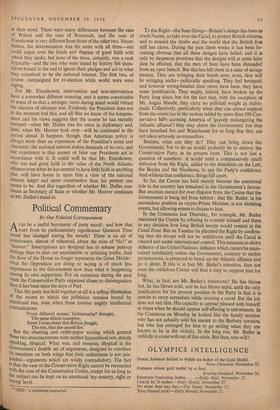Political Commentary
By Our Political Correspondent Acan be a useful barometer of party mood : and how that PART from its parliamentary significance Question Time mood has changed during the month ! There is an air of contrivance, almost of rehearsal, about the cries of 'No!' or `Answer !' Interruptions are designed less to release pent-up feelings than to shut out unpalatable or irritating truths. And the floor of the House no longer represents the Great Divide : what the Opposition are doing or saying is of much less importance to the Government now than what is happening among its own supporters. For on occasions during the past week the Conservative Party appeared closer to disintegration than it has been since the days of Peel.
That the party has held together at all is a telling illustration of the extent to which the politician remains bound by emotional ties, even when these involve mighty intellectual contradictions.
`From different causes,' Gobmouche* thought, 'The same effects transpire;
Some Tories cheer that Britain fought, The rest, that she ceased fire.'
But the cheering and order-paper waving which greeted these two announcements were neither hypocritical nor, strictly speaking, illogical. What was, and remains, illogical is the Government's double set of arguments, designed to convince its members on both wings that their enthusiasm is not mis- guided—arguments which are wildly contradictory. The fact is that the case of the Conservative Right cannot be reconciled With the case of the Conservative Centre, except for as long as the subject can be kept on an emotional 'my country, right or wrong' level.
OED ; 'a credulous journalist.'
To the Right—the Suez Group—Britain's design has been to crush Nasser, to take over the Canal, to protect British citizens, and to remind the Arabs and the world that the British lion still has claws. During the past three weeks it has been be- coming obvious that all these designs have failed; and it is only by desperate promises that the designs will at some later date be effected, that the men of Suez have been dissuaded from an open breach. But this has left them in a state of savage tension. They are wringing their hands now; soon, they will be wringing necks—politically speaking. They feel betrayed; and however wrong-headed their views have been, they have some justification. They might, indeed, have broken up the Party long since, but for the fact that, with the exception of Mr. Angus Maude, they carry no political weight as indivi- duals. Collectively, particularly when they can attract support from the centre (as in the motion tabled by more than 100 Con- servative MPs accusing America of 'gravely endangering the Atlantic alliance') they may alarm the Government; but they have breathed fire and Waterhouse for so long that they are not taken seriously as counsellors.
Besides, what can they do? They can bring down the Government; but to do so would probably be to destroy the Conservative Party in its present form. This is not just a question of numbers : it would need a comparatively small defection from the Right, added to the dissidents on the Left, the Boyles and the Nicolsons, to sap the Party's confidence. And without that confidence, things fall apart.
So far, the Centre has held mainly because the emotional tide in the country has remained in the Government's favour. But emotion cannot for ever disguise from the Centre that the Government is being led from behind : that Mr. Butler, in his anomalous position as crypto-Prime Minister, is not dictating events, but allowing events to dictate to him.
In the Commons last Thursday, for example, Mr. Butler reassured the Centre by refusing to commit himself and them to any decision how long British troops would remain in the Canal Zone. But on Tuesday he placated the Right by confirm- ing that the troops will not be withdrawn until the Canal is cleared and under international control. This amounts to direct defiance of the United Nations; defiance which cannot be main- tained indefinitely unless the Government, contrary to earlier protestations, is prepared to break up the Atlantic alliance and go it alone. If this is in fact Mr. Butler's intention, then not even the credulous Centre will find it easy to support him for long.
What, in fact, are Mr. Butler's intentions? He has blown hot, he has blown cold, and he has blown tepid, until the only justification for his present position in the Party is that it is unwise to swop caretakers while crossing a canal. But the job does not suit him. His capacity to appear pleased with himself at times when he should appear self-effacing is unfortunate. In the Commons on Monday he looked like the family retainer who has not actually sold his master to the Barbary corsairs, but who has arranged for him to go sailing when they are known to be in the vicinity. In the long run, Mr. Butler is unlikely to come well out of this crisis. But then, who will?


















































 Previous page
Previous page